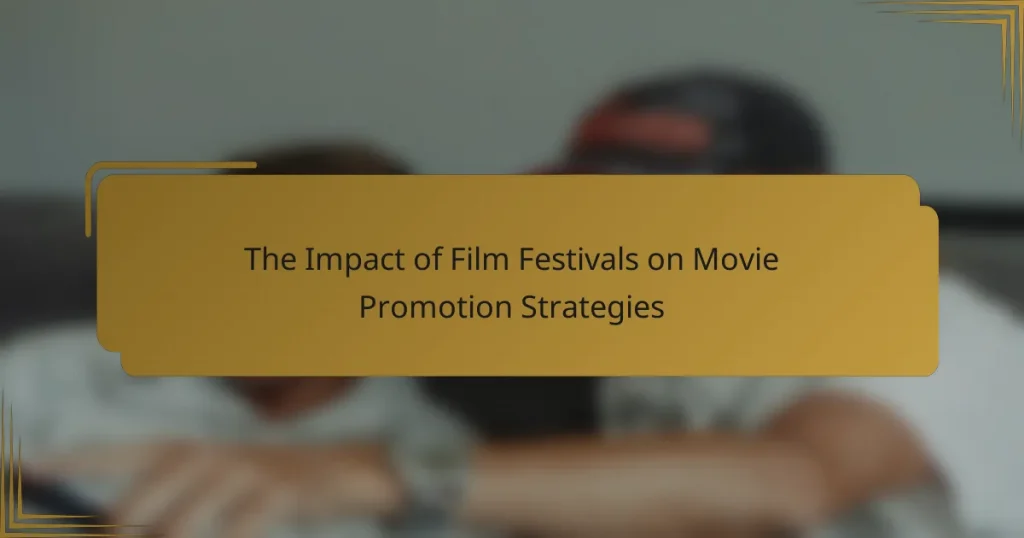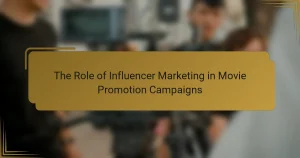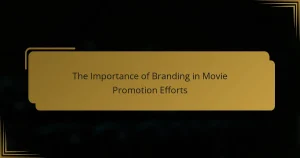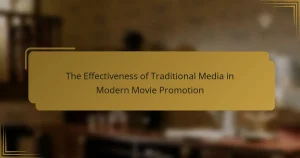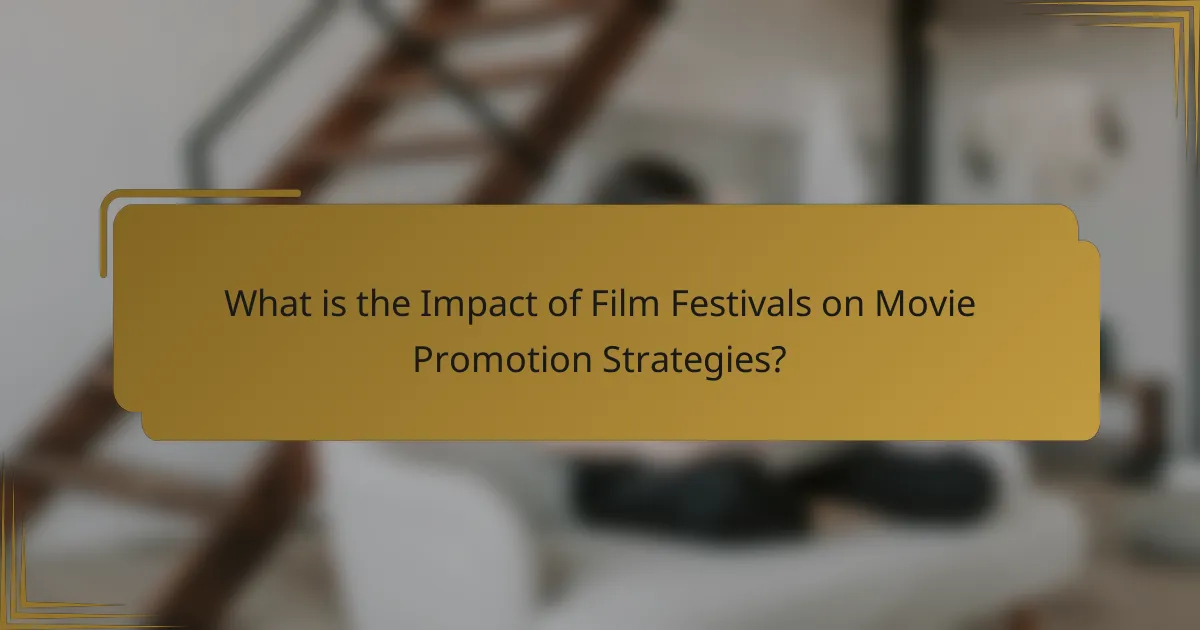
What is the Impact of Film Festivals on Movie Promotion Strategies?
Film festivals significantly influence movie promotion strategies. They provide a platform for filmmakers to showcase their work. Festivals attract industry professionals, critics, and audiences. This exposure can lead to increased media coverage. Films often gain traction through word-of-mouth at these events. Awards won at festivals can enhance a film’s credibility. For example, films that win at prestigious festivals like Sundance often see a boost in distribution deals. This demonstrates that participation in film festivals is a strategic move for filmmakers aiming to enhance visibility and marketability.
How do film festivals influence the visibility of films?
Film festivals significantly enhance the visibility of films. They provide a platform for filmmakers to showcase their work to industry professionals and audiences. Festivals often attract media attention, which amplifies the reach of featured films. For instance, the Cannes Film Festival has a long history of launching films that achieve critical and commercial success. Participation in festivals can lead to distribution deals, increasing a film’s market presence. Additionally, awards won at festivals can boost a film’s credibility and attract a larger audience. Statistics show that films premiered at major festivals often perform better at the box office. Therefore, film festivals are crucial in shaping the visibility and success of films in the competitive market.
What role do film festivals play in attracting audiences?
Film festivals play a crucial role in attracting audiences by showcasing diverse films and fostering a communal viewing experience. They provide a platform for filmmakers to present their work to potential viewers and industry professionals. Festivals often feature premieres, which generate buzz and excitement around new releases. Audience engagement is heightened through Q&A sessions, panels, and networking opportunities with filmmakers. According to a study by the University of Southern California, festivals can increase a film’s visibility and box office performance by up to 50%. Additionally, the festival atmosphere creates a sense of exclusivity and urgency, encouraging attendance. This combination of exposure, community, and excitement significantly enhances audience attraction.
How do film festivals enhance media coverage for films?
Film festivals enhance media coverage for films by providing a platform for premieres and networking opportunities. These events attract journalists, critics, and influencers, increasing visibility. Major festivals like Cannes or Sundance often generate extensive media coverage. Films showcased at these festivals receive reviews and press attention, which can influence audience interest. The concentrated media presence amplifies buzz and anticipation around new releases. Additionally, awards and accolades from festivals can further enhance a film’s profile. According to a study by the University of Southern California, films that premiere at festivals tend to perform better at the box office. This correlation highlights the critical role of film festivals in shaping media narratives and audience engagement.
What are the key elements of movie promotion strategies at film festivals?
Key elements of movie promotion strategies at film festivals include targeted marketing, networking opportunities, and audience engagement. Targeted marketing involves identifying specific demographics to reach with promotional materials. Networking opportunities allow filmmakers to connect with industry professionals and potential distributors. Audience engagement is achieved through Q&A sessions, panels, and interactive events. These strategies enhance visibility and increase the chances of acquiring distribution deals. Research indicates that films with strong festival presence often secure better box office performance.
What promotional tactics are commonly used at film festivals?
Film festivals commonly use tactics such as screenings, networking events, and panel discussions for promotion. Screenings allow filmmakers to showcase their work to audiences and industry professionals. Networking events facilitate connections between filmmakers, distributors, and potential collaborators. Panel discussions provide platforms for filmmakers to share insights and engage with audiences. Additionally, social media campaigns are employed to create buzz before and during the festival. Press releases and media coverage help attract attention from journalists and influencers. These tactics collectively enhance visibility and promote films effectively within the industry.
How do filmmakers leverage networking opportunities at festivals?
Filmmakers leverage networking opportunities at festivals to establish valuable industry connections. They engage with peers, producers, and distributors during networking events and screenings. This interaction can lead to collaboration on future projects. Filmmakers often attend panels and workshops to gain insights and meet influential figures. By participating in Q&A sessions, they can showcase their work and attract interest. Networking helps filmmakers secure funding and distribution deals. According to a study by the University of Southern California, 70% of filmmakers reported gaining significant contacts through festivals. These connections are crucial for career advancement in the competitive film industry.
Why are film festivals considered critical for independent films?
Film festivals are critical for independent films because they provide essential exposure and networking opportunities. Independent filmmakers often struggle to reach audiences and industry professionals. Film festivals serve as platforms for showcasing their work to a wider audience. Many successful independent films, such as “The Blair Witch Project,” gained traction through festival circuits. Festivals also attract distributors and investors looking for new talent. This exposure can lead to distribution deals that would be difficult to secure otherwise. Additionally, festivals often feature panels and workshops that educate filmmakers on industry trends. Overall, film festivals play a vital role in the promotion and success of independent films.
What unique advantages do film festivals provide for indie filmmakers?
Film festivals offer unique advantages for indie filmmakers by providing visibility, networking opportunities, and access to industry professionals. Visibility is crucial for indie filmmakers to showcase their work to a broader audience. Festivals like Sundance and Cannes attract significant media attention, increasing exposure. Networking opportunities allow filmmakers to connect with peers, potential collaborators, and industry insiders. This can lead to partnerships and future projects. Access to industry professionals, including distributors and producers, can facilitate distribution deals. According to a study by the University of Southern California, films that screen at festivals often have better box office performance. These advantages collectively enhance the chances of success for indie filmmakers.
How do film festivals affect the distribution deals for independent films?
Film festivals significantly influence distribution deals for independent films. They provide a platform for filmmakers to showcase their work to industry professionals and audiences. Successful screenings can lead to increased visibility and interest from distributors. Festivals often attract buyers looking for unique content, enhancing negotiation power for filmmakers. For instance, films like “The Blair Witch Project” gained distribution deals after festival success. Moreover, awards won at festivals can further validate a film’s marketability. This validation can result in better terms and wider release opportunities. Overall, film festivals serve as critical gateways for independent films to secure distribution deals.
How do major film festivals differ from smaller ones in terms of promotion?
Major film festivals differ from smaller ones in promotion by leveraging larger budgets and media attention. Major festivals like Cannes or Sundance attract global media coverage. This coverage amplifies the visibility of films showcased. They often have partnerships with major brands and sponsors, enhancing promotional efforts. Smaller festivals rely more on grassroots marketing and local media. Their budgets are typically limited, restricting promotional outreach. Major festivals also host high-profile events and red carpets that draw celebrities. This star power generates buzz and interest in films. In contrast, smaller festivals may focus on community engagement and niche audiences. The scale of promotion at major festivals significantly impacts the marketing strategies of films presented.
What benefits do larger festivals offer compared to smaller ones?
Larger festivals offer greater visibility and exposure for films compared to smaller ones. They attract a larger audience, including industry professionals and media. This increased attendance enhances networking opportunities for filmmakers. Larger festivals often have more extensive marketing budgets, leading to better promotion. They can secure high-profile guests and speakers, adding prestige to the event. Additionally, larger festivals may provide access to more resources, such as workshops and panels. Statistics show that films premiered at larger festivals often achieve wider distribution deals. For example, films showcased at Sundance or Cannes frequently gain international attention and funding.
How do the audiences and industry presence vary between major and minor festivals?
Major festivals attract larger audiences and prominent industry presence compared to minor festivals. Major festivals, such as Cannes and Sundance, draw thousands of attendees, including filmmakers, distributors, and media. These festivals often feature high-profile premieres and extensive press coverage. In contrast, minor festivals typically have smaller audiences, often consisting of local community members and independent filmmakers. The industry presence at minor festivals is limited, with fewer distributors and media representatives in attendance. According to a study by the University of Southern California, major festivals significantly increase visibility for films, leading to better distribution deals. This disparity in audience size and industry presence influences the promotional strategies employed by filmmakers at these events.
What are the emerging trends in film festival marketing strategies?
Emerging trends in film festival marketing strategies include increased digital engagement and personalized marketing. Festivals are leveraging social media platforms to create buzz around films. Virtual screenings have become popular, allowing broader access to audiences. Data analytics is being used to understand audience preferences better. Collaborations with influencers are enhancing visibility for films. Sustainability initiatives are also gaining traction, appealing to eco-conscious viewers. Additionally, immersive experiences like VR are being integrated into marketing efforts. These trends reflect the evolving landscape of film promotion.
How are digital platforms changing the landscape of film festival promotions?
Digital platforms are revolutionizing film festival promotions by enhancing accessibility and engagement. They allow festivals to reach global audiences through online streaming and social media. This shift increases visibility for filmmakers and their projects. For instance, platforms like YouTube and Instagram enable real-time updates and interactions. According to a 2021 report by the International Film Festival Summit, 70% of festivals utilized digital marketing strategies. This transition has also led to increased ticket sales and sponsorship opportunities. Digital platforms facilitate virtual screenings, expanding audience reach beyond geographical limitations. Thus, the landscape of film festival promotions is increasingly defined by digital innovation.
What innovative marketing techniques are being adopted by filmmakers at festivals?
Filmmakers are adopting several innovative marketing techniques at festivals. These include immersive experiences such as virtual reality installations. Filmmakers are also leveraging social media platforms for real-time engagement. Targeted influencer partnerships are being utilized to reach specific audiences. Interactive screenings with audience participation are becoming popular. Additionally, filmmakers are creating unique merchandise to enhance brand visibility. Data-driven strategies are being employed to analyze audience reactions and preferences. Collaborative events with local businesses are also on the rise. These techniques help filmmakers maximize exposure and build a dedicated fanbase.
What best practices should filmmakers follow for effective promotion at festivals?
Filmmakers should utilize targeted marketing strategies for effective promotion at festivals. They must create a compelling press kit that includes high-quality images, a synopsis, and bios. Engaging with festival audiences through Q&A sessions enhances visibility. Social media promotion is crucial; filmmakers should share behind-the-scenes content and updates. Networking with industry professionals can lead to valuable connections. Attending other screenings allows filmmakers to understand audience preferences. Early ticket sales can generate buzz and anticipation. Lastly, follow-up communications post-festival can maintain interest in the film.
How can filmmakers prepare for successful networking at film festivals?
Filmmakers can prepare for successful networking at film festivals by setting clear goals and researching attendees. They should identify key industry professionals to connect with. Creating a concise elevator pitch is essential for effective communication. Filmmakers should also prepare business cards or digital contact information for easy sharing. Practicing active listening can enhance conversations and build rapport. Attending panels and workshops provides opportunities for learning and networking. Engaging on social media before and during the festival helps establish connections. Following up with contacts after the festival is crucial for maintaining relationships.
What strategies should filmmakers use to engage audiences during festivals?
Filmmakers should utilize interactive screenings to engage audiences during festivals. Interactive screenings allow viewers to participate in discussions and Q&A sessions. These activities enhance audience connection with the film. Filmmakers can also host workshops to share their creative process. Workshops provide insights into filmmaking techniques and storytelling. Networking events foster relationships between filmmakers and attendees. Building community can lead to increased support for future projects. Social media engagement is another effective strategy. Filmmakers can share behind-the-scenes content and live updates. This approach keeps audiences informed and excited about the film. Engaging promotional materials, such as posters and merchandise, can attract attention. Visual elements create a memorable experience for festival-goers.
The main entity of the article is film festivals, which significantly impact movie promotion strategies. The article explores how these festivals enhance film visibility, attract audiences, and increase media coverage, ultimately influencing distribution deals for independent films. Key elements of successful promotion at festivals include targeted marketing, networking opportunities, and audience engagement through interactive events. Additionally, the article highlights emerging trends in digital engagement and innovative marketing techniques that filmmakers are adopting to maximize their exposure and success at these events.
